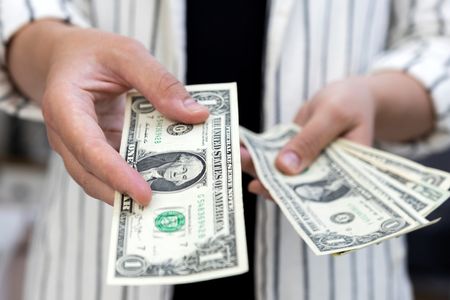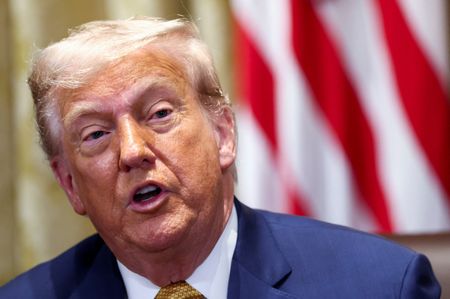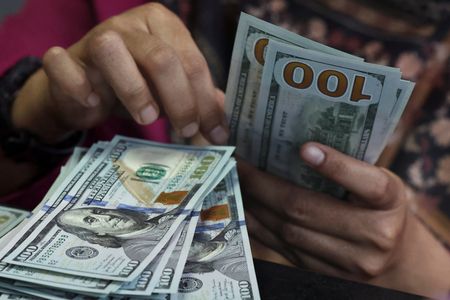By Kevin Buckland and Lucy Raitano
TOKYO/LONDON (Reuters) -The U.S. dollar stabilised on Thursday after retreating from a two-week high versus major peers, as markets took U.S. President Donald Trump’s latest tariff salvos in their stride, except in Brazil where a threatened 50% levy sent the real sliding.
The dollar had been knocked back by a sharp decline in U.S. Treasury yields after a 10-year note auction on Wednesday garnered strong demand, tempering worries about the “Sell America” narrative that saw Treasuries, the dollar and Wall Street stocks all sold off earlier this year.
Overall, investors were hungry for riskier assets, with the most damaging tariff scenarios looking increasingly unlikely. That helped Nvidia to become the first stock ever with a $4 trillion valuation, and lifted cryptocurrency bitcoin to an all-time peak just shy of $112,000.
Optimism was also buoyed by minutes of the Federal Reserve’s last meeting, with most policymakers of the opinion that interest rate cuts would be appropriate later this year.
The dollar index, which measures the currency against six major peers, was little changed at 97.416, finding a floor following a 0.2% decline on Wednesday, the same day that it pushed to the highest since June 25 at 97.837 before losing momentum.
The euro gained 0.1% to $1.1733 on Thursday, while sterling added 0.1% to $1.3609.
Against typical safe-haven currencies, the dollar held steady at 146.32 yen and 0.79420 Swiss francs.
With the exception of Brazil, Trump’s latest batch of letters to trade partners contained tariff rates close to those already proposed in his original “Liberation Day” announcement on April 2, as was the case with other letters this week.
Trump has also left the door open to extensions beyond the new August 1 deadline if countries make compelling proposals.
Brazil had originally been slated for just the baseline 10% levy, but Trump cited not just trade practices but the treatment of its former president, Jair Bolsonaro.
Bolsonaro, who was friendly with Trump when they were both in office, is on trial on charges of plotting a coup to stop current President Luiz Inacio Lula da Silva from taking office in January 2023.
The real dropped as much as 2.8% overnight to hit 5.6047 per dollar for the first time since June 6, and was last changing hands at 5.5826 per dollar.
“…the reasons are clearly politically motivated. Brazil is actually one of the very few countries with a trade deficit with the U.S.,” said Michael Pfister, FX analyst at Commerzbank.
“It’s worrying not only for the Brazilian real but also for the U.S. dollar, you can’t be sure which country might be next,” he said.
Trump and other officials have said several times lately that a deal with India is close, while the European Union is also edging toward a framework agreement.
The latest inflation data out of Norway showed June core inflation slightly higher than expected. Norway’s crown traded largely unchanged against the euro at 11.81 but was one of the few currencies to move against the dollar, last up 0.3% at 10.650.
Bitcoin was up 0.5% at around $111,268, just below the all-time high hit overnight of $111,988.90.
“The new record high came on improved risk sentiment,” IG analyst Tony Sycamore wrote in a note to clients.
“While the push to new highs hasn’t yet sparked the fireworks the market might have been hoping for, there is scope for bitcoin to make further gains towards $120,000.”
(Additional reporting by Kevin Buckland in Tokyo. Editing by Jamie Freed and Mark Potter)











